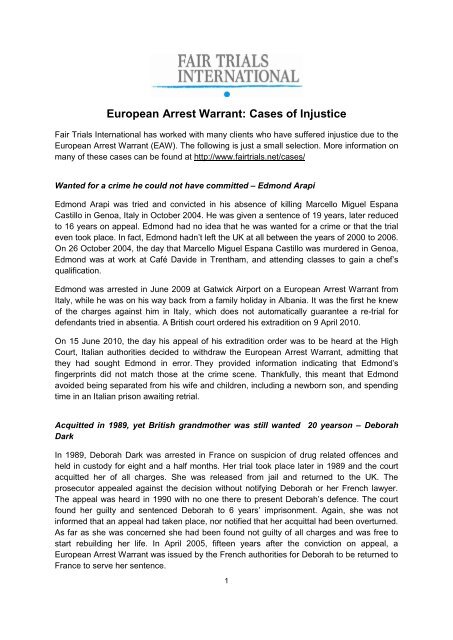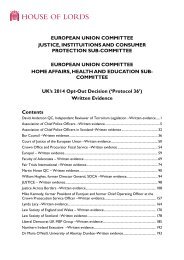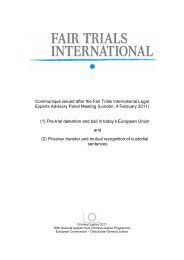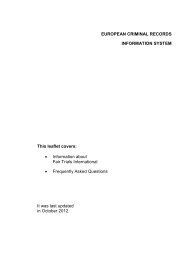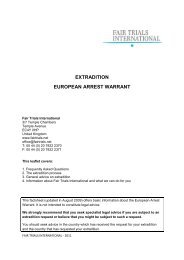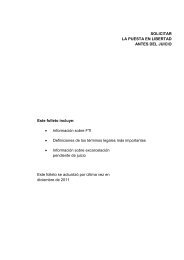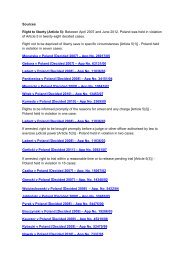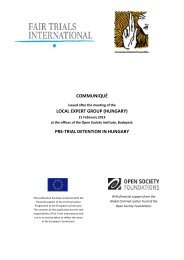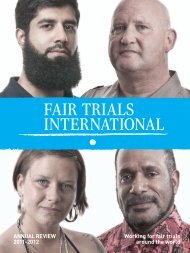European Arrest Warrant: Cases of Injustice - Fair Trials International
European Arrest Warrant: Cases of Injustice - Fair Trials International
European Arrest Warrant: Cases of Injustice - Fair Trials International
Create successful ePaper yourself
Turn your PDF publications into a flip-book with our unique Google optimized e-Paper software.
<strong>European</strong> <strong>Arrest</strong> <strong>Warrant</strong>: <strong>Cases</strong> <strong>of</strong> <strong>Injustice</strong><br />
<strong>Fair</strong> <strong>Trials</strong> <strong>International</strong> has worked with many clients who have suffered injustice due to the<br />
<strong>European</strong> <strong>Arrest</strong> <strong>Warrant</strong> (EAW). The following is just a small selection. More information on<br />
many <strong>of</strong> these cases can be found at http://www.fairtrials.net/cases/<br />
Wanted for a crime he could not have committed – Edmond Arapi<br />
Edmond Arapi was tried and convicted in his absence <strong>of</strong> killing Marcello Miguel Espana<br />
Castillo in Genoa, Italy in October 2004. He was given a sentence <strong>of</strong> 19 years, later reduced<br />
to 16 years on appeal. Edmond had no idea that he was wanted for a crime or that the trial<br />
even took place. In fact, Edmond hadn’t left the UK at all between the years <strong>of</strong> 2000 to 2006.<br />
On 26 October 2004, the day that Marcello Miguel Espana Castillo was murdered in Genoa,<br />
Edmond was at work at Café Davide in Trentham, and attending classes to gain a chef’s<br />
qualification.<br />
Edmond was arrested in June 2009 at Gatwick Airport on a <strong>European</strong> <strong>Arrest</strong> <strong>Warrant</strong> from<br />
Italy, while he was on his way back from a family holiday in Albania. It was the first he knew<br />
<strong>of</strong> the charges against him in Italy, which does not automatically guarantee a re-trial for<br />
defendants tried in absentia. A British court ordered his extradition on 9 April 2010.<br />
On 15 June 2010, the day his appeal <strong>of</strong> his extradition order was to be heard at the High<br />
Court, Italian authorities decided to withdraw the <strong>European</strong> <strong>Arrest</strong> <strong>Warrant</strong>, admitting that<br />
they had sought Edmond in error. They provided information indicating that Edmond’s<br />
fingerprints did not match those at the crime scene. Thankfully, this meant that Edmond<br />
avoided being separated from his wife and children, including a newborn son, and spending<br />
time in an Italian prison awaiting retrial.<br />
Acquitted in 1989, yet British grandmother was still wanted 20 yearson – Deborah<br />
Dark<br />
In 1989, Deborah Dark was arrested in France on suspicion <strong>of</strong> drug related <strong>of</strong>fences and<br />
held in custody for eight and a half months. Her trial took place later in 1989 and the court<br />
acquitted her <strong>of</strong> all charges. She was released from jail and returned to the UK. The<br />
prosecutor appealed against the decision without notifying Deborah or her French lawyer.<br />
The appeal was heard in 1990 with no one there to present Deborah’s defence. The court<br />
found her guilty and sentenced Deborah to 6 years’ imprisonment. Again, she was not<br />
informed that an appeal had taken place, nor notified that her acquittal had been overturned.<br />
As far as she was concerned she had been found not guilty <strong>of</strong> all charges and was free to<br />
start rebuilding her life. In April 2005, fifteen years after the conviction on appeal, a<br />
<strong>European</strong> <strong>Arrest</strong> <strong>Warrant</strong> was issued by the French authorities for Deborah to be returned to<br />
France to serve her sentence.<br />
1
In 2007, Deborah was arrested at gunpoint in Turkey, while on a package holiday with a<br />
friend. The police released her and were unable to explain the reasons for her arrest. Upon<br />
her return to the UK, she went to the police station and tried to find out the reasons for her<br />
arrest. She was told that she was not subject to an arrest warrant. In 2008 Deborah travelled<br />
to Spain to visit her father who had retired there. On trying to return to the UK, she was<br />
arrested and taken into custody in Spain, where she faced extradition to France. Deborah<br />
refused to consent to the extradition, and was granted an extradition hearing. After one<br />
month in custody, the Spanish court refused to extradite Deborah on the grounds <strong>of</strong><br />
unreasonable delay and the significant passage <strong>of</strong> time. Deborah was released from prison<br />
and took a flight back to the UK. However, her ordeal was not over.<br />
On arrival in the UK, Deborah was arrested again - this time by the British police at Gatwick<br />
airport. Once again, she refused to consent to the extradition and was released on bail<br />
pending another extradition hearing. The City <strong>of</strong> Westminster Magistrates’ Court refused the<br />
extradition in April 2009.<br />
As there is no provision for the withdrawal <strong>of</strong> the <strong>European</strong> <strong>Arrest</strong> <strong>Warrant</strong>, Deborah spent<br />
years as an effective prisoner in the UK – feeling unable to leave the country due to the risk<br />
<strong>of</strong> being re-arrested on the same <strong>European</strong> <strong>Arrest</strong> <strong>Warrant</strong>. In May 2010, France finally<br />
agreed to remove the <strong>European</strong> <strong>Arrest</strong> <strong>Warrant</strong>, but only after Deborah had spent years as<br />
an effective imprisonment in the UK due to the risk <strong>of</strong> arrest.<br />
20 year old Briton extradited on evidence obtained by police brutality – Andrew<br />
Symeou<br />
Andrew Symeou, a university student <strong>of</strong> exemplary character with a bright future ahead <strong>of</strong><br />
him, was on holiday with friends in Zante, Greece in 2007. One night while Andrew was in<br />
Zante, another young Briton fell <strong>of</strong>f an unguarded stage in a night-club, tragically dying two<br />
days later from his head injury. Andrew insists he was not even in the club at the time – and<br />
many witnesses have since confirmed this. He was never sought for questioning at the time,<br />
and knew nothing about the incident when he flew home at the end <strong>of</strong> his holiday.<br />
A year later, he was served with an EAW seeking his extradition to Greece to stand trial for<br />
murder. Only during the course <strong>of</strong> his legal challenge has it emerged that the EAW is based<br />
on completely flawed evidence, much <strong>of</strong> it extracted through the brutal mistreatment <strong>of</strong> two<br />
witnesses who have since retracted their (word-for-word identical) statements. Despite this,<br />
in October 2008, the Westminster Magistrates court ordered his extradition to Greece.<br />
Andrew appealed to the High court on the grounds that British courts should refuse to<br />
execute a <strong>European</strong> <strong>Arrest</strong> <strong>Warrant</strong> when evidence has been obtained through witness<br />
intimidation and police brutality. Unfortunately, the High court refused his appeal and he was<br />
extradited to Greece in July 2009. Andrew was held for 10 months in appalling prison<br />
conditions before his release on bail. However, he has been unable to leave Greece.<br />
Sadly, Andrew’s trial was adjourned due to the prosecution’s failure to ensure their<br />
witnesses had received the court summons to make them aware <strong>of</strong> the trial date. Andrew<br />
has had no opportunity to present his defence case and has been told that his trialwill only<br />
take place in March 2011, almost four years after the events in question.<br />
2
Extradited after a grossly unfair trial – Garry Mann<br />
Garry Mann, a 51-year-old fireman from Kent, went to Portugal during the Euro 2004 football<br />
tournament. On 15 June 2004 while Garry was with friends in a bar in Albufeira, a riot took<br />
place in a nearby street. Garry was arrested along with other suspects some 4 hours after<br />
the alleged <strong>of</strong>fences. He was tried and convicted, less than 24 hours after his arrest. He had<br />
no time to prepare his defence and standards <strong>of</strong> interpretation at the trial were grossly<br />
inadequate. He was convicted following a widely publicised trial in Albufeira and sentenced<br />
to two years’ imprisonment on 16 June 2004. On 18 June 2004 he voluntarily agreed to be<br />
deported and was told that, provided he did not return to Portugal for a year, he would not<br />
have to serve his sentence.<br />
Back in the UK, Garry tried unsuccessfully to appeal his conviction. In October 2004 he<br />
lodged an appeal to the Constitutional Court in Lisbon but heard nothing from the Court.<br />
Separately, the Metropolitan police applied for a worldwide football banning order against<br />
Garry, but in 2005 the Court held he had been denied a fair trial in Portugal and refused the<br />
order. Garry was astonished when he was arrested on a <strong>European</strong> <strong>Arrest</strong> <strong>Warrant</strong>, alleging<br />
he was wanted in Portugal to serve a two year prison sentence. In August 2009 a British<br />
court ordered his extradition to Portugal.<br />
Garry appealed against this decision to the UK’s High Court in March 2010. Lord Justice<br />
Moses described the case as an "embarrassment" and said: "If there was a case for<br />
mediation or grown up people getting their heads together then this is it." The judge said that<br />
new evidence from the Foreign and Commonwealth Office "lends force to his belief that a<br />
serious injustice" had been committed against Mr Mann. Despite this there were no grounds<br />
upon which to refuse Garry’s extradition and he was surrendered to prison in Portugal in<br />
May 2010, where he remains today.<br />
Extradited yet not charged – Turner and McGoldrick<br />
Hungarian authorities sought the extradition <strong>of</strong> Michael Turner, a 27 year old British national<br />
from Dorset, and business partner Jason McGoldrick (37), following the failure <strong>of</strong> their<br />
business venture in Budapest.<br />
Michael was extradited to Hungary under a <strong>European</strong> <strong>Arrest</strong> <strong>Warrant</strong> on 2 November 2009<br />
and was held in prison for four months, during which time he was interviewed only once by<br />
police. He was released from jail on 26 February 2010 and was allowed to return to the UK,<br />
but was requested to return for further police interviews in April.<br />
The <strong>European</strong> <strong>Arrest</strong> <strong>Warrant</strong> is intended to be used to extradite people to serve a prison<br />
sentence or for the purposes <strong>of</strong> a criminal prosecution. <strong>Fair</strong> <strong>Trials</strong> <strong>International</strong> is concerned<br />
that, in Michael’s case, an extradition took place even though no decision had yet been<br />
made to prosecute him. Hungary´s investigation is still ongoing with charges neither brought<br />
nor dropped against Michael.<br />
The <strong>Arrest</strong> <strong>Warrant</strong> was used improperly in this case, to extradite Michael and Jason while<br />
the investigation into the failed business was still ongoing, subjecting them to four<br />
unnecessary months in prison in extremely difficult conditions. This is not uncommon and<br />
3
yet there no clear right <strong>of</strong> compensation or financial penalty against countries abusing the<br />
EAW system in this way.<br />
<strong>Warrant</strong> issued after police brutality – Yarrow and Tonge<br />
Michael Tonge and Lee Yarrow were arrested on holiday in Crete in 1999 after a nightclub<br />
fight in which Michael sustained injuries. Lee was released from police custody after 4 days<br />
but Michael was held on remand for 4 months, during which he was beaten, kicked, flogged<br />
with a rope and denied food and medical treatment. He was then released and came back<br />
to England, only for both men to be arrested on <strong>European</strong> <strong>Arrest</strong> <strong>Warrant</strong>s in 2005, with no<br />
explanation for the delay. At their eventual trial in Greece, charges were dropped against<br />
Lee. Michael was convicted <strong>of</strong> assault, served a short sentence in Greece and was released<br />
and returned to the UK in August 2007. Once again, an EAW was executed despite serious<br />
police misconduct and abuse and following unreasonable delay.<br />
UN called their trial unfair, but brothers extradited anyway – Michael and Brian Hill<br />
In 1997 the Human Rights Committee <strong>of</strong> the United Nations reported that Michael and Brian<br />
Hill had been denied a fair trial in Spain following their arrest in 1985 and were entitled to a<br />
remedy “entailing compensation” as a result. But Spain failed to comply with this ruling.<br />
Instead, it issued a <strong>European</strong> <strong>Arrest</strong> <strong>Warrant</strong> seeking the brothers’ extradition to Spain. In<br />
October 2005, Michael Hill was arrested in Portugal and extradited to Spain where he served<br />
7 months for breach <strong>of</strong> parole conditions. They had already served three years in prison in<br />
Spain.<br />
Disproportionate use <strong>of</strong> the <strong>European</strong> <strong>Arrest</strong> <strong>Warrant</strong> – Patrick Connor<br />
Patrick Connor (not his real name) was just 18 when he went on holiday to Spain with two<br />
friends. While there, all three were arrested in connection with counterfeit euros. Patrick<br />
himself had no counterfeit currency on him or in his belongings when arrested and has no<br />
idea how the notes came to be on his two friends and in their rented apartment – in total, the<br />
police found 100 euros in two notes <strong>of</strong> 50. The boys were held in a cell for three nights. On<br />
the fourth day they appeared in court and had a hearing lasting less than an hour, at the end<br />
<strong>of</strong> which they were told they were free to leave but might receive a letter from the authorities<br />
later.<br />
They returned to the UK and heard no more about it until four years later when, as Patrick<br />
was studying in his room at university, <strong>of</strong>ficers from the Serious Organized Crime Agency<br />
arrested him on a <strong>European</strong> <strong>Arrest</strong> <strong>Warrant</strong>.<br />
Patrick was extradited to Spain and held on remand in a maximum security prison in Madrid.<br />
Other inmates told him he might be in prison for up to two years waiting for a trial. Under<br />
immense pressure and fearing for his future, he decided to plead guilty, even though several<br />
grounds <strong>of</strong> defence were available and he would have preferred to fight the case on home<br />
ground, on bail, and with a good lawyer he could communicate with in English. None <strong>of</strong> this<br />
was possible, and he ended up spending 9 weeks in prison before coming home to<br />
commence his university career, his future blighted by a criminal record.<br />
4
This is an example <strong>of</strong> how EAWs are being issued in a disproportionate way, wasteful <strong>of</strong><br />
costs and having an unduly harsh effect on individuals’ personal lives.<br />
<strong>Fair</strong> <strong>Trials</strong> <strong>International</strong> has serious concerns about the injustices resulting<br />
from Europe’s fast-track extradition system.<br />
To learn more, click here.<br />
5


